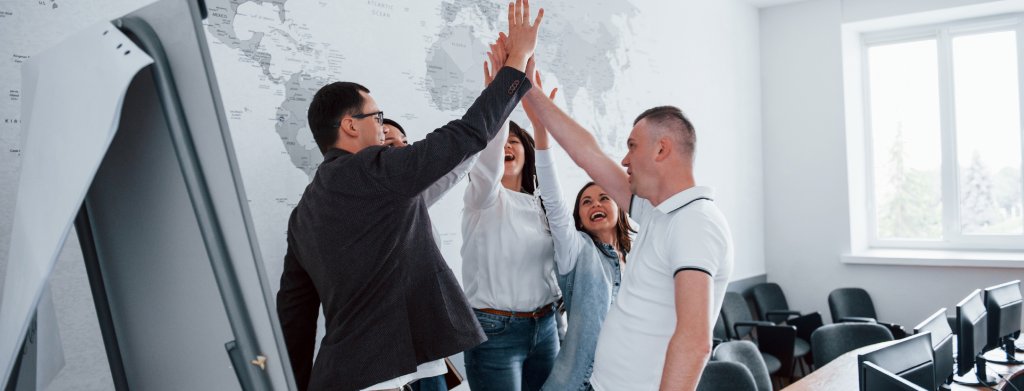Executive Podcast #313: Teaming for Success (Part 2) with Chris Fuller

In this follow-up episode, Chris Goede, Perry Holley, and special guest, Chris Fuller, deep dive into the world of team dynamics and how understanding your team’s unique wiring can unlock their true potential. They explored the power of the RightPATH behavioral assessment, which provides invaluable insights into each team member’s intensities, relationship keys, confrontation styles, and response to change. By leveraging these insights, you can create a team culture that fosters collaboration, resilience, and success!
This episode is sponsored by Visit Orlando. Whether for business or entertainment, visit Orlando, where the possibilities for business travel are unbelievably real!
References:
Learn more about Teaming for Success at MaxwellLeadership.com/Teaming.
Order John Maxwell’s new book High Road Leadership!
Become a Maxwell Leadership Certified Team Member!
Get the Maxwell Leadership Growth Plan!
Download our Learner Guide for this podcast!
Chris Goede:
Hey, listeners, Chris Gode here with some bonus business insight before we jump into today’s episode. If you’re looking for the right place to host your next business gathering, conference or event, look no further than Orlando, Florida. It’s no coincidence that Maxwell leadership hosts our biannual international Maxwell Conference in Orlando. Between its many luxurious hotels, meeting spaces and venues, Orlando is the perfect place for you and your team to gather, collaborate and grow. Whether you’re traveling for business or bringing your company for a meeting, there’s a reason Orlando is as much a business capital as an entertainment one. And let’s not forget the delicious cuisine at one of the many Michelin rated restaurants where your team can kick off your evenings. So before you plan your next business event, check out Orlando, where the possibilities for business travel are unbelievably real. Learn more at OrlandoForBusiness.com.
Perry Holley:
Welcome to the Maxwell Leadership executive podcast, where our goal is to help you increase your reputation as a leader, increase your ability to influence others, and increase your ability to fully engage your team to deliver remarkable results. Hi, I’m Perry Holly at Maxwell leadership facilitator and coach.
Chris Goede:
And I’m Chris Cote, executive vice president with Maxwell leadership. Welcome and thank you for joining. Before we get started, I just want to let you know this is a two part series, and if you missed our last episode, you need to go back and listen to that one first. You can listen to this one, you’ll get something out of it. But we set the foundation on the last one, so I want to make sure that you go and listen to that title for this session is teaming for success part two. Now, all of you that give Perry a hard time about these crazy titles, this was probably the most bland second part title. But thank you because it was easy for me.
Perry Holley:
I had easy. It was written on the code, or.
Chris Goede:
You brought that just in case I didn’t read it. That’s right. But, man, this is such a big topic. We’re now doing more with less in organizations and with teams. We’re being asked to lead through difficult times and, and, man, we need to understand our teams and the dynamics behind that. So Chris Fuller, who is the owner CEO of Rightpath, also a very, very good friend of Maxwell leadership, has been for years helped us develop content. He delivers content, coaches, you name it. And so we’ve partnered with him for years now as being kind of our behavioral profile when it comes to leading the soft skills, easy part of leadership as a great tool and as a resource.
Chris Goede:
So, Chris, man, thanks for being here again today. Talk just real quickly for those that weren’t with us last week a little bit about Rightpath, and then we’re going to jump into some incredible insights on the different types of factors and styles that that put together a team.
Chris Fuller:
So Wrightpath Resources was founded out of this massive need of organizations to make sure that we had the right people in the right spot. And the assessments that were out there, the disc and the Myers Briggs, they were a little bit too fluid. And some of the things that was dialing in on the precision of, can I really predict this person’s behavior? And I know they show up this way sometimes, but then there’s not really a total predictability. So Wrightpath was founded into the depth and the accuracy of the tool to be able to get six organizational psychologists to help really tighten up the science, to make sure that it was more of a behavioral wiring than it was just a personality or temperament, that accuracy really helps drive fit, which fit is a precursor to toxicity. So you get a team member that is in the wrong spot and they’re unhappy about it, they’re not getting energy from that, they’re getting drained from it, and before you know it, they are exporting that unhappiness 100% to the rest of the team.
Chris Goede:
Yeah.
Chris Fuller:
That really out of that passion was the foundation of it. And then the extrapolation out of the hiring or the talent, really, that talent acquisition and placement into now extrapolated impact into leadership and teaming and culture and coaching and all those things. So that really is the passion of the tool, is to make a difference, and the impact of the tool is in its depth and its accuracy.
Chris Goede:
We have seen it be tremendous success both in the one on one coaching relationship, but then also in the teaming environment.
Perry Holley:
And I won’t do a coaching call if I don’t have. Right.
Chris Goede:
Without understanding. Yeah, yeah.
Perry Holley:
It’s a starting point.
Chris Goede:
It’s a great starting point. Speaking of kind of the personal assessment, oftentimes we will say, hey, what’s it like to be on the other side of my leadership? And then we run out the room. Right. Because we really don’t want to know that answer. But our team’s like, well, I’ll tell you, but we don’t ever give them the opportunity to do that. And I know early on in this time, together with the team, we actually are asking that question. And what drives that is in this assessment itself is the actual intensities of which you’re measured off of. Right.
Chris Goede:
It’s how you’re going to show up probably a little bit stronger than you’re aware of and could be a blind spot. Maybe not, but talk a little bit about the power of the intensities that this assessment comes back and makes us, as leaders, aware not only of ourselves, but then the intensities in our team members as well.
Chris Fuller:
One of the one liners that I have is how people experience you becomes their expectation of you. So if I’m experiencing you and you are in the weeds and you’re driving on some of these particular pieces, I expect every time I come to you to have that same experience. Experience drives expectation. Now, here’s the tough part. For us as leaders, expectation becomes our reputation, and our reputation, ultimately is our brand. So this intensity aspect. So when you and I experience, you know, Chris, and we look at his.
Chris Goede:
Intensity, wait a minute, this wasn’t intervention.
Chris Fuller:
So when somebody is more logical than 98% of humanity, or more experience based than 92% of humanity, or more assertive, organized, ambitious, more concrete, like, no, you two are inventive, and you can fly, you know, but I’m looking for the plan, and I don’t want to reinvent the wheel. Let’s just go in on those things. So the intensity of that becomes how I experience you. And you can move through learned behavior and through focus. I can flex on some things, but when you’re more intense than 98% on logic, if I try to reach you with an illogical argument, there’s no way that’s going to land or that’s going to make an impact. The same thing with Perry, when we talk about his need, that extroverted, the need to be verbal, but also that supportive, collaborative, diplomatic side. If I’m not aware of that, then ultimately the intensities, then that’s going to be. I’m like, well, why can’t you just be, like, talk plain, like, hold people accountable? Like, tell them that they’re not cutting it.
Chris Fuller:
And he’s going, well, I think really what we need to do is collaborate a little bit more and train them and build them up a little bit, and then eventually they’ll.
Chris Goede:
So I’m going to give them one more chance. I’m going to call them again.
Chris Fuller:
So, again, how people experience us becomes their expectation, which becomes our reputation, which ultimately becomes our brand. And that is squarely in the intensities of your profile. You can move a mid level. It’s going to take a tremendous amount of energy to move an intensity.
Chris Goede:
What I love about this is if you understand those intensities, it solves a lot of what ends up happening is when you don’t have that knowledge, you fill in a lot of the blank space with your own thoughts about why their intensity is the way it is, versus this gives you a tool that says, oh, no. Like, this is how they’re showing up. I’m experiencing it. It’s my expectation, because this is how they’re wired. Like, how do I. How do I partner with that? How do I have the right motive and leverage that to the best use of the team versus just being extremely.
Perry Holley:
Frustrated with it and your intensities? And correct me, but I’ve always said.
Chris Goede:
That I think I got it from.
Perry Holley:
You, is that your intensities really formulate your superpower. Where I’m most intense, it’s where I’m at. These things you just read about Chris, about me, that’s part of what makes us great. But it also, the self awareness thing comes back in, is that on the back of every superpower we teach, that there’s a blind spot, potentially, and I can over. Can I overdo my intensities?
Chris Fuller:
Well, so, you know, we’ve. We’ve all talked about. I don’t really. I don’t really work on weaknesses. I work on situational struggles. So if you’re assertive and independent and blunt and logical and challenging, you’re going to be great in crisis management. But we might not want to put you on the crisis management hotline. So that awareness that ultimately says it’s all goodness.
Chris Fuller:
But, you know, I love the saying that says, if a fish is judged by its ability to climb a tree, it will always be deemed a failure. That’s not what fish are for. So, again, you have strengths and areas where you’re like, man, put me in coach, and right here. But this is going to take energy from me, and this is going to be a situational struggle. So, really understanding that, you know, it’s unlocking as a leader, it’s unlocking the genius of my team instead of just all of this trying to do, you know, be a generalist instead of a specialist.
Chris Goede:
All right, so I just had this quick aha moment, and when you’re talking about Perry and I, this is almost like, this is a podcast counseling session for the host here. It makes total sense. Like, when I’m at a place where logically I’m frustrated and I’m bouncing it off of a friend of mine, and he’s, without a doubt, he’ll be like, let me go talk to him.
Perry Holley:
Let me go. Let me go talk. Let me go.
Chris Goede:
I’m like, there’s nothing to talk about. Like, and so that verbal skill set, which is what you’re saying is, man, that’s his superpower, one of his intensities. And so I should lean into that more when I am disconnected, being like, hey, would you go talk to Chris? Because I’m like, there’s something that’s just nothing, you know, I’m not picking up that he’s putting down. And then more than likely, you’re going to be able to verbally process through that and come back and be like, here, idiot. Don’t fix that. Right? Like, and so I was just had that kind of aha. Moment about that. Because you say that to me all the time.
Chris Goede:
I’ll go talk to. Yeah.
Chris Fuller:
So that comes into this. This concept of lead, where you’re strong and team or partner, where you strong, that’s good. And so the best of you, the genius of you, lead out in that. But where we can come along next to each other and sort of have that completion aspect, then, then can we work on that part? It’s where we need each other, where teaming for success actually comes from.
Maxwell Leadership Growth Plan Ad:
Hey, podcast listeners, many of you listening right now would probably love the autonomy that comes with owning your own business or becoming a coach that helps other businesses succeed. Well, we have a phenomenal strategy where you are 100% in control of your own business, earning income on your own terms, and have access to the people, tools, and resources you need to build a thriving leadership development business. When you become a Maxwell leadership certified team member, you join a global community of entrepreneurs led by our expert team of mentors and faculty, including John C. Maxwell. You’ll also get one of the top leadership certifications in the world next to your name, giving you the boost you need to get started. Visit us online at maxwellleadership.com/jointheteam to find out more.
Perry Holley:
One of the early points in here is about relationship keys. And you said something last week on the podcast. You said about teams, a bunch of individuals going after a shared cause, and we got it. We know where everybody is. But what is the importance of this relationship keys that we take from the right path?
Chris Fuller:
So if I’m not aware, as a leader, around the wiring of the team, then I’m not really aware of how to lead my team. And so from Perry, from your perspective as a networker and the concept of the networker, and then, Chris, from yours as an analyzer, strategic thinker, the difference is, Perry, if the environment is too gritty, if the environment is too contentious, then ultimately you’re going, man, I just think we need to collaborate more. We really all need to get on the same page. Let’s go talk it out. Let’s, let’s work through this particular piece. And so really, that, that environmental, that ecosystem, the culture aspect, if I understand your relationship keys, I’ve got to make sure that we are much more in this peaceful environment, if you will. This aspect where we’re collaborating and accommodating, and it’s this yin and yang and we’re in that flow, but on Chris’s side, because ultimately, from your side, again, it’s like, well, wait a minute, are we set up right? Are we collaborating? Are we trained right? Like, let’s all team on this particular piece. And then Chris is like, wait a minute, you know, what do we need to get done? When do we need to get it done? By what plan are we doing these particular pieces and his need for structure and details and then results into this checkpoint.
Chris Fuller:
Like, what’s our metrics like? Are we meeting our metrics? How are we going along those particular pieces? And if I don’t understand the relationship keys of those underpinnings, those non conscious jungian drivers, if you will, then I really don’t understand how to relate to you, and then I don’t understand how to build that leadership teaming culture for, for the best impact, for the best success.
Chris Goede:
We build everything that we talk about off the foundation of the five levels of leadership. This is a tool that helps support your level two connection. Like, there are things that you will learn about each other and this team that will allow you to connect with them or stay connected with them, maybe even a better term, by just having the awareness of that. We also often talk about when we have to have tough conversations as a team. We also go, man, I don’t want to lose my influence with them. And if I don’t do it the right way, we’re not going to produce. I might lose my level two influence. What I love about this tool is also in addition to intensities and the relationship key, you also have a confrontation style index that allows us to know how do they receive, how do they like, how do I like confrontation? And it just breaks it down brilliantly to be able to do that without losing your level two connection, trust and influence with them.
Chris Goede:
Talk a little bit about Perry’s confrontation style and but the power of this tool, all joking aside, and how that really helps the team dynamics to be able to do that, to be able to do that well, there’s the confrontational one.
Chris Fuller:
I like the fact that he’s actually confronted, and what we mean by that is he’s kind of posturing that he’s like, you know, putting up this front that he’s willing to confront on those things. But ultimately, his method of confrontation is really going to be motivation. It’s really going to be persuade and influence. And so if there’s something that he’s got to come up against from that conflict style, he’s much more of a diplomat, influencer, persuader, motivator, and you’re much more of the prescriptive. And so it’s like, look, here’s the thing. I’m just trying to make sense of this, and so this doesn’t make sense. I’m trying to get into this piece. So you’re more high conflict in the numeric scoring because you’re trying to get to the logic of it.
Chris Fuller:
Does it make sense? And let me get to that. And you’re not afraid to confront the math. And he’s going, yeah, but the math doesn’t matter if the people, if the people aren’t willing to accept that. Mathematic. We use these. The teaming for success is great for assimilation workshops. So a brand new leader inherits a brand new team, and then these teaming for success workshops are great to be able to get to know each other very quickly and to diminish the opportunity for us to get sideways, because now I know how you’re going to conflict and or if you’ve got a new team member rolling on to be able to say, hey, we’re a gritty culture, and gritty is okay as long as you say, we love robust dialogue. It’s not me against you.
Chris Fuller:
It’s like, we just love to have the open, honest, critical dialogue. So I think that that’s key in understanding the conflict, the conflict tendencies of the team and then ultimately being able to normalize the culture of, here’s what we are and here’s how we do what we do so that we don’t lose the disengagement of some of those and those, you know, if it was too contentious, then Perry would start to maybe back up on us a little bit.
Perry Holley:
I did a workshop where this is harmony versus challenge, and the entire room was over on challenge. They had zero harmonious in the room. And I drew a circle on the screen, and I said, does this concern anyone? And the leader said, should it concern? I said, well, no, I’ve known you a bit, and I know that you have. I didn’t use the word as a gritty environment. You guys have respectful challenge. You seem to respect each other, care for each other, but you challenge each other, and I think it’s done in the right way. And so you’ve used this strength, this intensity toward challenge in a very positive manner to move the team ahead. It’s not like some people would back off and shut down.
Perry Holley:
Like you said, they didn’t. So I really love that. Another thing in this workshop we talk about, another calculation done in the right path is about drive, an individual drive. Tell me, how does that play into the team dynamic?
Chris Fuller:
So there’s a little bit of a misunderstanding about drive. So you have those that are much more, I’d say, subtle on their drive, and they can stay locked in on something for a long time. You know, those that are a little bit more driven, we may end up losing a little bit of focus because, like, you know, like, we need to get in and conquer it, and then we need to get to something else to go.
Chris Goede:
Yeah, I’m thinking about the guy that’s.
Chris Fuller:
Talking, and so it’s like, man, I’m going to go from conquer to conquer to conquest. Conquest. You know, it’s like all of the. That drivenness, you know, when we look at drive scores, one of the things is based on your drive and based on a little bit of that adventure aspect, I can actually start to predict who might be a flight risk on your team. Because if we don’t put them with enough variability and enough projects and enough of that ability to conquer, then ultimately they’re going to look for conquering outside of our organization instead of inside. So when a team has that high drive, we know that they’re going to be this high impact, high power team that is going to have that resilience that we’re not even going to see roadblocks. If you’re much more on that, that subtle on the drive, the team members with subtle are going to be steady as the day is long, and, man, do we need them. But they’re also going to look for others to remove roadblocks.
Chris Fuller:
And so if I didn’t know that you’re concrete and practical, if I didn’t know that you’re subtle on your drive score, then I would go, Perry, like, yeah, go. Attack it. Like, go, you know, but it’s like, wait a minute. Okay, so now I understand you. I get to know you. And again, the difference between the resilience and the intensity of the drive versus the brilliance of much more of that subtlety in that drive aspect.
Chris Goede:
One last area that I just want us to talk about before we wrap up is around change. And as leaders, we talk about the capacity of which they can handle change is different between each team member. And so even if you have a collective change, you’re going to have to lead each one of them a little bit differently through that. That is a delicate thing that as leaders, we need to be able to handle. But it’s something that happens almost weekly, right? Maybe around here daily in regards to the change. And so what I love about it is this also tells us, as an individual and as a team, what is the response to change? What are the metrics that are used to pull that out? What does that look like? How as a team member or a leader, is that going to be helpful to me, this tool to be able to lead them through change?
Chris Fuller:
So when you look at the, you know, let’s just. We’ll go with a six factor. So if somebody is dominant and challenging, they’re gonna love change. Dominant, challenging and adventurous, they’re gonna love change as long as it’s their idea. And so you’re like, wait a minute. Who’s changing? Well, yeah, we need to change this. And as long as it’s your idea, man, you are mashing that gas pedal. All gas, no break.
Chris Fuller:
Right? So, and then the networkers and the parries of the world that are maybe a little bit more accommodating, more extroverted, more harmonious, are like, well, wait a minute, let’s talk about it. I love talking about change. I love dreaming about change and the impact of change. Yeah, but what are we doing to get people ready for change? So his extroversion, but then his need for structure and support, setting people up for success, he’s going to appear to love change and talk about change, but then you’re going to feel a little bit of a resistant vibe from him because he’s going, now, wait a minute. We can’t change because we’ve changed too much. And good people that have worked here a long time aren’t set up for success. And so ultimately, the different psychological components of your internal drivers determine how fast that change saturation occurs, the level of adoption and buy in of change, but also then the appearance of a lack of buy in or resistance is nothing more than I actually can tell you. The secret sauce to unlock my willingness to change.
Chris Fuller:
And so through that data and the insights and the analytics, those are some of the key pieces where I’m not judging your inability or lack of desire to change, I’m actually seeing now what it’s going to take to move you in that change, and that is so.
Chris Goede:
Key, is going to then also lead to a more resilient team. By the way, if you understand that and know that and take that approach versus just coming in and going, there’s a change. Well, I’m going to wrap us up because the three of us could probably sit here and talk about this for some time. What we’d love to do is we’d love to come talk about it with you, with your team. It is a powerful team dynamic. It’s a team day that we would highly encourage. So if you’re interested in that, we’d love for you to go to maxwellleadership.com teaming and you’ll fill out that form. We would love to follow back up with you.
Chris Goede:
There is no doubt this session, I’ve loved this session even more than the first session because of how practical and logical this gets right here. Right? And he picked on Perry, which I’m totally fine with. But, man, when you start talking about the relationships and the intensities and change in confrontation, I will share this as we wrap up. Not only is this good for individuals and teams, but also it’s really good for your marriage and other relationships that now, some of that language gets similar to you, which I’ve heard a testimony just recently about, again, thrown back in our face about, about this because Chris has, you know, helped us work through some of those things. And so it is just a great growth tool. And, Chris, super grateful for you. This tool and the impact that you’ve had not only on our lives, but Maxwell leadership partners throughout the year. So thank you for being here, man.
Chris Goede:
I appreciate it.
Perry Holley:
Great stuff, Chris. Goady. And thank you, Chris Fuller. I do agree. This has been a life changer for me personally. I have used it in the marriage and with kids and how they’re built, what their wiring is like. It’s just fantastic. So, as Chris Gode said, if you’d like to know more information about this maxwellleadership.com/teaming, you can fill out a form there.
Perry Holley:
You can also leave a question or a comment from there. We love hearing from you, and we’re very grateful you’d spend this time with us. That’s all today from the Maxwell Leadership executive podcast.
To be a Successful Leader, You Need Feedback on Your Leadership.
We’re excited to announce our new and improved Organizational Effectiveness Survey (OES). The OES gathers feedback from employees to give leaders and management the knowledge and action plans needed to develop a more effective and productive work environment. Our new version measures 4 areas of your business: Leadership, People, Strategy, and Performance.














Be the first to comment on "Executive Podcast #313: Teaming for Success (Part 2) with Chris Fuller"